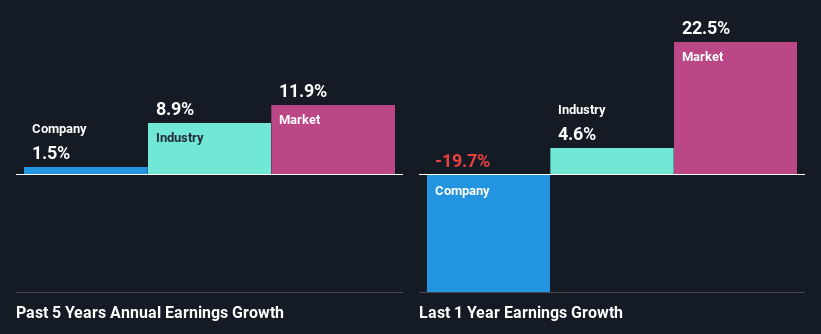Is LSI Industries Inc.'s (NASDAQ:LYTS) Recent Performancer Underpinned By Weak Financials?
It is hard to get excited after looking at LSI Industries' (NASDAQ:LYTS) recent performance, when its stock has declined 9.9% over the past three months. We decided to study the company's financials to determine if the downtrend will continue as the long-term performance of a company usually dictates market outcomes. Particularly, we will be paying attention to LSI Industries' ROE today.
Return on Equity or ROE is a test of how effectively a company is growing its value and managing investors’ money. Simply put, it is used to assess the profitability of a company in relation to its equity capital.
See our latest analysis for LSI Industries
How Do You Calculate Return On Equity?
The formula for return on equity is:
Return on Equity = Net Profit (from continuing operations) ÷ Shareholders' Equity
So, based on the above formula, the ROE for LSI Industries is:
5.5% = US$7.2m ÷ US$131m (Based on the trailing twelve months to March 2021).
The 'return' refers to a company's earnings over the last year. One way to conceptualize this is that for each $1 of shareholders' capital it has, the company made $0.05 in profit.
Why Is ROE Important For Earnings Growth?
Thus far, we have learned that ROE measures how efficiently a company is generating its profits. We now need to evaluate how much profit the company reinvests or "retains" for future growth which then gives us an idea about the growth potential of the company. Assuming everything else remains unchanged, the higher the ROE and profit retention, the higher the growth rate of a company compared to companies that don't necessarily bear these characteristics.
LSI Industries' Earnings Growth And 5.5% ROE
On the face of it, LSI Industries' ROE is not much to talk about. We then compared the company's ROE to the broader industry and were disappointed to see that the ROE is lower than the industry average of 12%. Therefore, LSI Industries' flat earnings over the past five years can possibly be explained by the low ROE amongst other factors.
We then compared LSI Industries' net income growth with the industry and found that the company's growth figure is lower than the average industry growth rate of 8.9% in the same period, which is a bit concerning.
Earnings growth is an important metric to consider when valuing a stock. The investor should try to establish if the expected growth or decline in earnings, whichever the case may be, is priced in. Doing so will help them establish if the stock's future looks promising or ominous. One good indicator of expected earnings growth is the P/E ratio which determines the price the market is willing to pay for a stock based on its earnings prospects. So, you may want to check if LSI Industries is trading on a high P/E or a low P/E, relative to its industry.
Is LSI Industries Using Its Retained Earnings Effectively?
With a high LTM (or last twelve month) payout ratio of 74% (implying that the company keeps only 26% of its income) of its business to reinvest into its business), most of LSI Industries' profits are being paid to shareholders, which explains the absence of growth in earnings.
Moreover, LSI Industries has been paying dividends for at least ten years or more suggesting that management must have perceived that the shareholders prefer dividends over earnings growth.
Summary
Overall, we would be extremely cautious before making any decision on LSI Industries. Because the company is not reinvesting much into the business, and given the low ROE, it's not surprising to see the lack or absence of growth in its earnings. With that said, the latest industry analyst forecasts reveal that the company's earnings are expected to accelerate. Are these analysts expectations based on the broad expectations for the industry, or on the company's fundamentals? Click here to be taken to our analyst's forecasts page for the company.
This article by Simply Wall St is general in nature. It does not constitute a recommendation to buy or sell any stock, and does not take account of your objectives, or your financial situation. We aim to bring you long-term focused analysis driven by fundamental data. Note that our analysis may not factor in the latest price-sensitive company announcements or qualitative material. Simply Wall St has no position in any stocks mentioned.
Have feedback on this article? Concerned about the content? Get in touch with us directly. Alternatively, email editorial-team (at) simplywallst.com.

